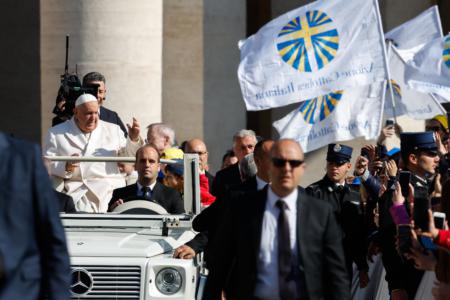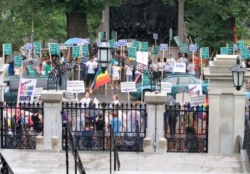Legislature delays vote on proposed marriage amendment
BOSTON — The Massachusetts Legislature delayed a vote on a proposed amendment that would have restored the traditional definition of marriage by recessing their constitutional convention until Nov. 9. The new date is two days after the general election.
The July 12 joint session of the state Senate and House lasted for four hours before a motion to recess was upheld by a 100-91 vote.
“This move shows the flagrant disregard for the will of the people by Senate President Travaglini and every legislator who voted to recess the convention until November,” Kris Mineau, spokesman for VoteOnMarriage.org, said in a statement.
Mineau went on to say that the recess was especially troubling because before the successful vote to recess until November, nearly three-quarters of Massachusetts’s lawmakers voted against recessing the convention until July 17.
Over 170,000 Massachusetts voters, the largest number in Massachusetts history, signed a citizens initiative petition supporting the proposed constitutional amendment. The proposed amendment must receive the approval of 25 percent of the Legislature meeting in joint constitutional convention in two sessions before it can appear on the ballot in 2008. The amendment would leave existing same-sex marriages intact and would leave open the possibility of same-sex civil unions.
Before the delay, Senate President Robert E. Travaglini, D-Boston, had released a statement on July 12 assuring legislators that all items on the calendar would be addressed in 2006.
“As the presiding officer of the constitutional convention, it is my responsibility to allow debate, no matter how contentious the issue,” he said. “It is my intention to bring all of the items on the calendar before the body for a vote. However, each of the 20 items left on the calendar is likely to generate significant debate among the members and we will see how far we get in the proceedings on Wednesday.”
Ed Saunders, executive director of the Massachusetts Catholic Conference, the public policy arm of the Catholic Church in Massachusetts, said that Travaglini’s statement is encouraging.
“The Senate president has promised in a public statement that all items on the constitutional convention will come to a vote this year,” he said. “We look forward to Nov. 9.”
“What the people need to do in the meantime,” he added “is turn their attention to their representatives and their senators and find out where they stand on taking a vote on this.”
Supporters of the amendment have maintained that they are confident that if allowed to come to a vote, the amendment has the support and would garner the 50 votes necessary to move forward. They have also voiced concerns about legislators blocking the vote, a move that happened in 2002 on a similar amendment to protect marriage. Then-Senate President Thomas Birmingham adjourned a constitutional convention without a vote on a legislator-initiated amendment. The Massachusetts Supreme Judicial Court ruled in 2003 that Birmingham’s action was not legal.
The Supreme Judicial Court also ruled last month that the citizens initiative petition is constitutional. Gay & Lesbian Advocates & Defenders, GLAD, filed suit and challenged the language of the amendment. GLAD contended the amendment violated a constitutional provision, which prohibits amendments intended to reverse a judicial decision.
The court’s unanimous decision held that the citizens initiative petition did not reverse the Goodridge decision because the language of the amendment would not affect the same-sex couples who have already married. Instead, the amendment would define each future marriage in the state as the union of one man and one woman.
<

















